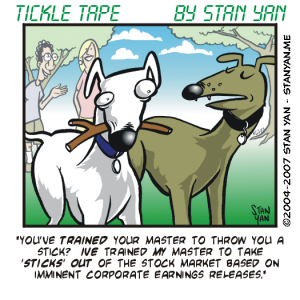Trading is rough business for many reasons. First, success is not assured. Second, even when one attains success, it may be fleeting. The odds are against you as a trader, and only a select few can conquer seemingly insurmountable obstacles to achieve lasting success. That’s where psychology can play an important role. The proper psychological attitude can help you achieve and maintain success.
There are many occupations that are hard to do. Imagine working as the president of a large corporation or a government official in hard economic times. Imagine trying to sell insurance when few people have enough money to buy it. Not anyone can succeed under such extreme pressure, but people do. What you need to decide is whether you want to persist in the face of uncertainty or shrink from the challenge.
In terms of making a profit, the hard part isn’t trading profitably, but staying profitable. Trading can be tedious. You have to make trade after trade. Even when market conditions are in your favour, it can be tedious if you have to trade day after day, year after year. Even the most resilient trader is prone to burn out. It is easy to persist when you believe that your efforts will be rewarded. That’s how people do hard things, like get through college. They believe the hard work will pay off and that long-term success will be assured. Trading is different, however.
There comes a point when you discover that success is not assured. You find out that you can make huge profits one year, and almost nothing the next. The future isn’t certain, and that can make even the most astute trader feel uneasy. A trader may be prone to “learned helplessness.” When you experience a setback that seems insurmountable, you may start to believe that there is no way to get out of it. If you tried extremely hard to stay profitable and can’t do it, you may start to think, “What is the point? Why should I continue with this, if I can’t remain profitable?” It is natural to want to seek out a new profession, but don’t despair.
Recovering from setbacks is vital for long-term success. Enduring trading success isn’t guaranteed, but few things in this world are a certainty. When all seems hopeless, don’t give up. Search for solutions, and take a specific action. Remind yourself that it’s not the objective “hopeless” situation that causes one to give up, but the interpretation of the situation. How you explain the cause of the dire situation accounts for how you cope with it. If you think, “I’ve always been inept and this is just another instance of how ineffectual I’ve always been,” you will tend to view the situation as hopeless and want to just give up. But if you think, “this is merely a temporary setback and I’ll be able to get past it,” you will search for solutions to change matters and overcome the dire situation.
Trading is a tough business in which one must often persist in the face of defeat. Your thinking style dictates your persistence level. It’s unproductive to think pessimistically, and believe that all is hopeless. Instead, view seemingly hopeless failures as a temporary setback from which you can easily recover if you keep at it. By looking for specific aspects of your trading that you can actually change, and believing you can change them, you will face setbacks with optimism rather than despair and helplessness.


